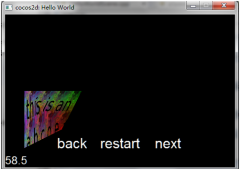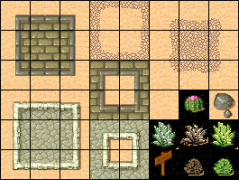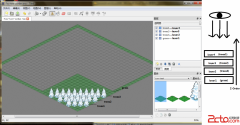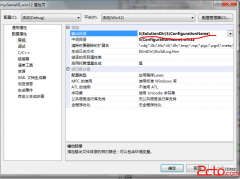MFC中显示cocos2d-x
存在的问题:没实现立即动态更改分辨率,而是通过缩放改变窗口的大小:
void CAnimateMakerView::OnSize(UINT nType, int cx, int cy)
{
CFormView::OnSize(nType, cx, cy);
#if 1
if (::IsWindow(m_picture.m_hWnd))//&&m_bInitCoco)
{
CRect rect;
m_picture.GetWindowRect(rect);
ScreenToClient(rect);
rect.right = cx - rect.left;
rect.bottom = cy - rect.left;
m_picture.MoveWindow(rect);
if (m_bInitCoco)
{
m_picture.resize(rect.Width(),rect.Height());
printf("cocos2d size=%dX%d",rect.Width(),rect.Height());
//CCDirector::sharedDirector()->reshapeProjection(CCSizeMake(rect.Width(),rect.Height()));
}
}
#endif
}

Cocos2dXWin.cpp
// Cocos2dXWin.cpp : 实现文件
//
#include "stdafx.h"
#include "AnimateMaker.h"
#include "Cocos2dXWin.h"
#include "CCEGLView.h"
#include "CCApplication.h"
#include "AppDelegate.h"
// CCocos2dXWin
IMPLEMENT_DYNAMIC(CCocos2dXWin, CWnd)
CCocos2dXWin::CCocos2dXWin()
{
m_iWidth=0;
m_iHeight=0;
}
CCocos2dXWin::~CCocos2dXWin()
{
}
BEGIN_MESSAGE_MAP(CCocos2dXWin, CWnd)
END_MESSAGE_MAP()
// CCocos2dXWin 消息处理程序
BOOL CCocos2dXWin::CreateCocos2dXWindow()
{
//新建一个CRect变量获取窗口的客户区大小
CRect tClientRect;
GetClientRect(&tClientRect);
//调用cocos2d中的CCApplication::sharedApplication()获取Cocos2d-x程序类单件实例对象。调用其run函数。在这里我们传入四个参数,与第一章“HelloWorld”不同的是这里增加了新参数“当前窗口的句柄”。这是使用MFC来嵌入Cocos2d-x窗口的关健所在。我们暂时埋个伏笔,后面再详解。
//resize(tClientRect.Width(),tClientRect.Height());
CCEGLView* eglView = CCEGLView::sharedOpenGLView();
m_iWidth=tClientRect.Width();
m_iHeight=tClientRect.Height();
eglView->setFrameSize(m_iWidth,m_iHeight, GetSafeHwnd());
cocos2d::CCApplication::sharedApplication()->run(1);//GetSafeHwnd(),TEXT("第一个Cocos2d-x程序"),tClientRect.Width(),tClientRect.Height());
//这里将变量设置为TRUE
m_bInitCocos2dX = TRUE;
return TRUE;
}
void CCocos2dXWin::resize(float width, float height)
{
if (m_bInitCocos2dX)
{
CCEGLView* eglView = CCEGLView::sharedOpenGLView();
//eglView::CCEGLViewProtocol.setFrameSize(width, height);
//eglView->setFrameSize(width, height, GetSafeHwnd());
eglView->resize(width, height);
// float newScale = (float)(enabled ? 2 : 1);
//eglView->setContentScaleFactor(5);
float scaleX=width/m_iWidth;
float scaleY=height/m_iHeight;
//float scale=scaleY<scaleX?scaleY:scaleX;
float scale=MIN(scaleY,scaleX);
CCDirector::sharedDirector()->setContentScaleFactor(scale);
}
}
Cocos2dXWin.h
#pragma once
// CCocos2dXWin
// #include "CCEGLView_win32.h"
// #include "Classes/AppDelegate.h"
#include "cocos2d.h"
#include "AppDelegate.h"
class CCocos2dXWin : public CWnd
{
DECLARE_DYNAMIC(CCocos2dXWin)
public:
CCocos2dXWin();
virtual ~CCocos2dXWin();
//创建Cocos2dX窗口
BOOL CreateCocos2dXWindow();
AppDelegate app;
void resize(float width, float height);
protected:
DECLARE_MESSAGE_MAP()
//是否已经初始化
BOOL m_bInitCocos2dX;
float m_iWidth;
float m_iHeight;
};
void CCEGLView::resize(int width, int height)
{
if (! m_hWnd)
{
return;
}
POINT ptDiff;
// calculate new window width and height
RECT rcClient;
if (!m_bUseMfc)
{
RECT rcWindow;
GetWindowRect(m_hWnd, &rcWindow);
GetClientRect(m_hWnd, &rcClient);
ptDiff.x = (rcWindow.right - rcWindow.left) - rcClient.right;
ptDiff.y = (rcWindow.bottom - rcWindow.top) - rcClient.bottom;
rcClient.right = rcClient.left + width;
rcClient.bottom = rcClient.top + height;
}
m_windowWidth = width;
m_windowHeight = height;
const CCSize& frameSize = getFrameSize();
if (frameSize.width > 0)
{
m_windowTouchScaleX = frameSize.width / width;
m_windowTouchScaleY = frameSize.height / height;
TCHAR buff[MAX_PATH + 1];
memset(buff, 0, sizeof(buff));
swprintf_s(buff, MAX_PATH, L"%s - %0.0fx%0.0f - %0.2f",
kWindowClassName, frameSize.width, frameSize.height, 1.0f / m_windowTouchScaleX);
SetWindowText(m_hWnd, buff);
if (m_bUseMfc)
{
OutputDebugString(buff);
OutputDebugString(_T("\n"));
}
}
if (!m_bUseMfc)
{
AdjustWindowRectEx(&rcClient, GetWindowLong(m_hWnd, GWL_STYLE), false, GetWindowLong(m_hWnd, GWL_EXSTYLE));
// change width and height
SetWindowPos(m_hWnd, 0, 0, 0, width + ptDiff.x, height + ptDiff.y,
SWP_NOCOPYBITS | SWP_NOMOVE | SWP_NOOWNERZORDER | SWP_NOZORDER);
}
}
相关新闻>>
- 发表评论
-
- 最新评论 进入详细评论页>>

![cocos2d_x+lua[2]](/uploads/allimg/131030/110J64609-0-lp.jpg)








